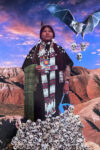
[Coffee House Press; 2025]
Audition by New Zealand writer Pip Adam starts with an unconventional premise. Three giants (Stanley, Alba, and Drew) are in a spaceship named Audition; their bodies keep growing if they remain silent, but their noise is what propels the ship in space, so they have to keep talking. The first chapter mainly consists of back-and-forth dialogue between the giants, dazzling with its absurdist humor that is reminiscent of Beckett’s plays, with its sense of nothingness and existential anxiety. The giants keep repeating lines like: “They have done a great job of building this beautiful spacecraft called Audition and we are all lucky to be inside her.” They seem to have lost part of their memories prior to being in the classroom—a training camp on earth they had to attend in order to prepare for the journey on the ship. At first, they try to remain positive through the amnesia and the physical discomfort of constriction: “Talking about before the classroom and New York in the fall and how we got to the classroom or where is the help is too negative and now is not the time and it is what it is, and we need to stop thinking so much.” But traces of an unknown conflict rise to the surface through the cloud of denial and self-help language. “We should have smashed them,” one of the giants blurts out of nowhere. “What?” Alba says. “Who said that?”
Prior to this, they had stopped talking as a means of resistance, even though this would likely break the ship and lead to their death. It’s not fully clear how they ended up here or what they are resisting. But more details from the past slowly start to emerge, first from the classroom, and then from the fragmented moments before it.
The beginning of the novel feels like an absurdist, speculative tale about where we’re going as a species as a result of our collective amnesia and denial. But the novel morphs as we move into the close third-person point of view of Torren, a teacher at the classroom, and then Alba in the following chapters. As Alba’s memories return, the novel transitions more to realist fiction or social commentary. The reader learns that prior to the classroom, on earth, Alba had been normal-sized and had ended up in prison because of hitting Drew, almost to death. She had difficulty fitting in there and was physically harmed by other inmates and guards. In the prison, she met Stanley, a trans character, and they developed a romantic relationship. Following a new court hearing for Alba’s case, and after Alba and Stanley’s relationship had ended, the three characters began growing in size. This growth is what connected them to each other. Then, after a failed prison escape, aided by Drew from the outside, the three of them were sent to the classroom along with other giants. As a result of the classroom, “any memory of how powerful they thought they were going to be together [was] gone.” Sending the giants away on spaceships was a strategy to deal with the problem of the space they occupied on earth.
The novel focuses on the injustice and brokenness of the original incarceration, but also hints at other injustices. “No one could make her out,” the novel describes Alba’s ethnic ambiguity in the prison, “‘You Maori?’ one of the skinheads had said to her and she’d shook her head. ‘But you’re not white.’” The initial fight between Alba and Drew was also connected to race and identity; Drew had “called Alba white trash. It wasn’t the trash that worried Alba. She knew what she was, she didn’t have any delusions of grandeur. Alba was light now, now that her mother had bleached any ounce of her father out of her, but she wasn’t white, it wasn’t that simple.”
The book concludes when the ship crashes into a planet where aliens rule and different terms of life apply. But there is possibly a level of acceptance and hope for the main characters despite the complexities of this new life: “They never belonged anywhere and maybe that’s why they can work with this so fully.” In the acknowledgments section of the book, Adam says that the book is about the abolition of prisons and our punishment-based justice. It can also be read more widely as a story about belonging, and the cruelty of our society towards difference. “We’re not what most people want,” the giants tell the aliens. “When we were small – we have grown you see – when we were small we were not good news it appears, or rather, we have just remembered, and then we got big – big for earth you understand – we were even less good news.”
Formally, the novel transitions from play-like dialogue, to the closer third-person point of view of individual characters, moving back-and-forth in time, slowly revealing what led the characters to this moment. The book also uses the technique of pastiche, taking scenes and dialogues from a number of romantic comedies. The book fits well alongside recent experimental novels that explore concerns of justice and identity such as Isabel Weidner’s Sterling Karat Gold and Christina Rivera Garza’s The Iliac Crest. Audition is a genre-defying and politically conscious addition to this genre, standing as a work of fiction that intrigues at the level of both form and narrative.
Babak Lakghomi is the author of South (Dundurn Press, 2023) and Floating Notes (Tyrant Books, 2018). His writing has appeared in American Short Fiction, NOON, Electric Literature, The Cincinnati Review, Fence, and Southwest Review, among others. He was born in Tehran, Iran, and currently lives and writes in Toronto.
This post may contain affiliate links.






